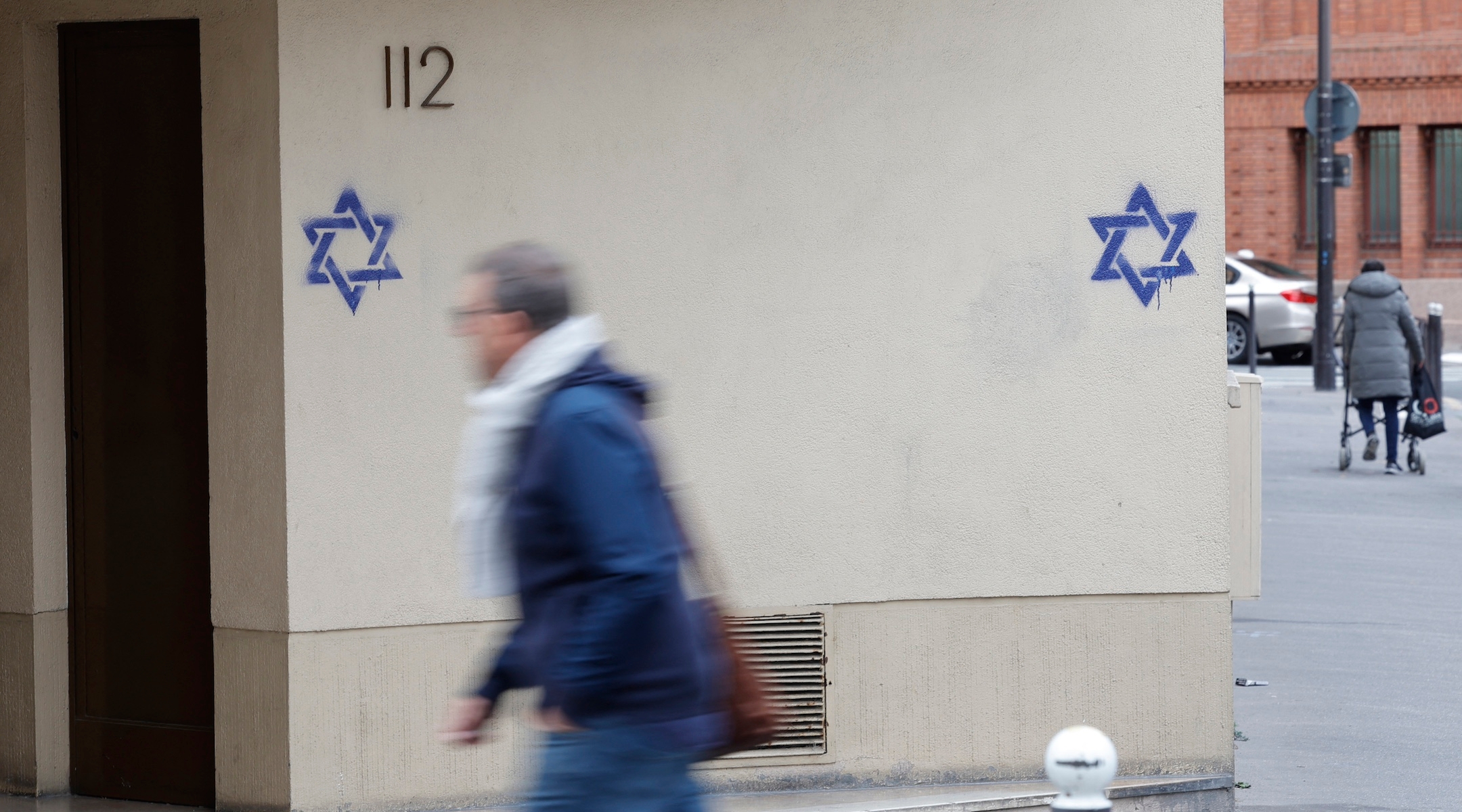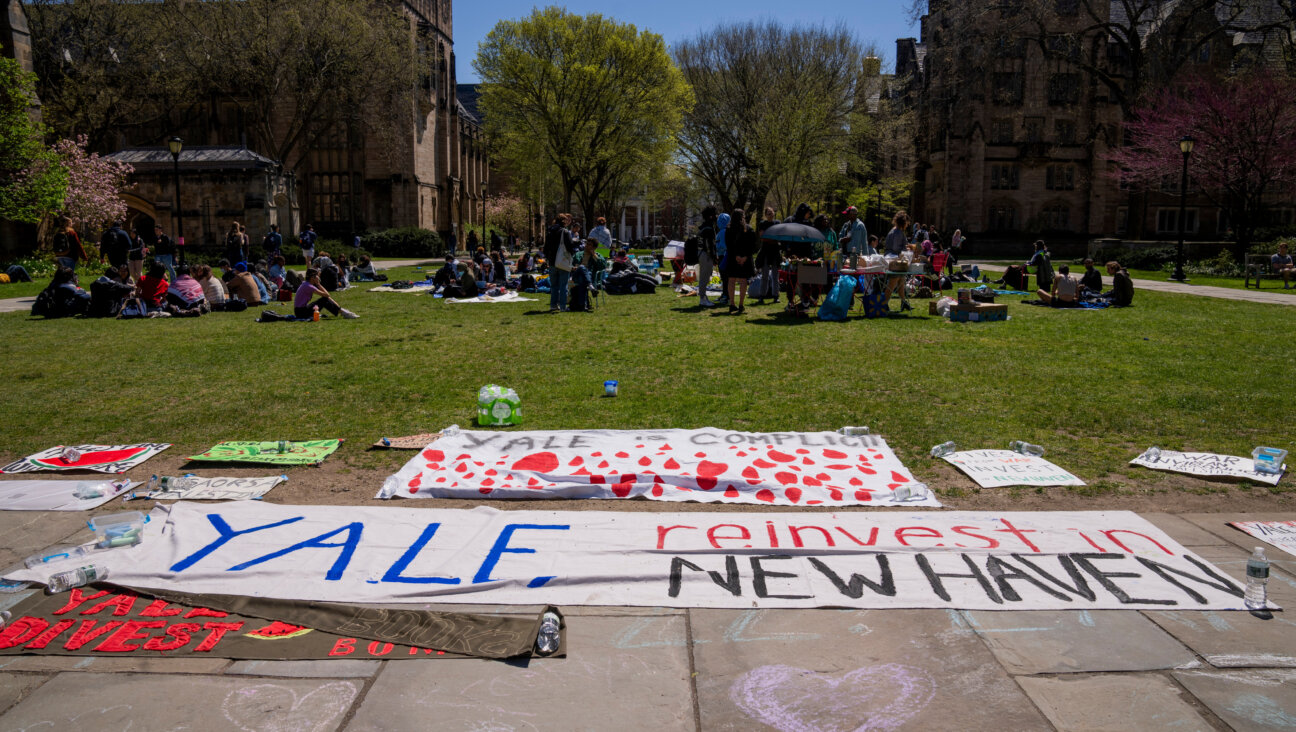As antisemitism spikes across Europe, more fingers are pointing at Russia

A man walks along a building whose facade is covered with Stars of David in the Alesia district of Paris, Oct. 31, 2023. (Geoffroy van der Hasselt/AFP via Getty Images)
(JTA) — When Stars of David began appearing on Jewish homes and institutions in Paris’ 10th arrondissement late last month, as well as on a Jewish woman’s home in Berlin, many were quick to bring up comparisons to the Nazi era.
But French authorities pointed to a surprising culprit: Russia.
According to French authorities, the pictures of the Stars of David first began to spread via a Russian-run news site called Recent Reliable News (RRN) before being found by others online. Shortly after the incident went viral, VIGINUM, France’s intelligence unit devoted to tracking foreign digital interference, recorded more than 1,000 bots making over 2,500 posts related to the incident on X, the social platform formerly known as Twitter.
RRN, seemingly a news aggregator, was revealed in June to be part of a network of web domains used by Russian hackers for a disinformation operation targeted at Western Europe known as “Doppelganger.” RRN and sites like it were used to mimic major news outlets and even government sites, sharing information with a clearly pro-Russia slant.
“VIGINUM has a high degree of confidence that these bots are affiliated to the RRN network, given that one of their main activities consists in redirecting people to RRN websites,” France’s foreign ministry said in a press release earlier this month. “France strongly condemns the involvement of the Russian network Recent Reliable News (RRN/Doppelgänger) in the artificial spreading and initial distribution on social media of photos of graffiti representing Stars of David in the 10th arrondissement of Paris.”
As antisemitism has spiked in Europe in the wake of the Israel-Hamas war, multiple investigations have pointed to Russian involvement in stoking an already tense situation. While motives remain unclear, experts have noted that fomenting already brewing divisions and chaos in the West has been a tradition of Russia’s security services since the Cold War.
French investigators noted that their probe is ongoing, and they still have yet to confirm if the vandalism was the work of Russian state-backed actors. But they revealed that two suspects arrested in connection with the graffiti were Moldovan nationals who allegedly painted the stars on the orders of an unknown individual whom they communicated with by phone in Russian. (While Moldova’s national language is Romanian, like many other former Soviet republics, Russian has remained a first language for many of its citizens.)
As more details about the vandalism emerged, more questions were raised. For one, not all of the stars were sprayed on Jewish buildings. Second, the style of the stars — from an elegant stencil, in a deep blue color reminiscent of the Israeli flag — seemed out of place for an antisemitic incident.
While the details remain murky, Nina Jankowicz, the U.S vice president of the Centre for Information Resilience and an expert on disinformation, said the episode tracks with Russia’s modus operandi.
“This definitely seems like it could fit the bill of the types of provocation that Russia has been known to be behind in the past,” Jankowicz told the Jewish Telegraphic Agency. “Russia uses these pre-existing fissures in society to drive further polarization or drive issues that are hot button issues in society, generally, without regard for, for the context.”
Such moves have been part and parcel of Russia’s foreign policy for decades and a key feature of its so-called “hybrid war” since its invasion of Ukraine in February 2022.
“Driving polarization in Western societies is really an easy way to have wins for Russia,” Jankowicz said.
That hasn’t been restricted to amplifying divisive topics in the digital sphere. During the 2016 U.S. elections, dueling protests unfolded on the streets of Houston, Texas, both for and against a local Islamic center. What neither side fully knew at the time was that both protests were spawned by Facebook groups made by operatives in Moscow.
“I think we’d like to think that at this point, Russia is just doing stuff on the internet and then poisoning dissidents every so often. But these sorts of on the ground operations — which sometimes aren’t carried out in the most perfect way — are 100% the sort of thing that they’ve done in the past, and that they continue to do even after the U.S. election in 2016,” Jankowicz said.
Jankowicz noted that Russia is an equal opportunity inciter, switching from causes on the right to left at will, and the country is no stranger to using antisemitism as a weapon. In fact, it’s a trick cribbed straight from the Soviet Union playbook.
“During the Soviet period, especially in places like Germany, Russia, would very deliberately deface memorials and use antisemitic attacks, as late as the 80s, in order to stoke the specter of antisemitism,” she said.
In the late 1980s, before German reunification, Rainer Sonntag, the leader of West Germany’s most influential Neo-Nazi group, was doing double duty as a spy for both the East German Stasi and Soviet KGB. During the Eichmann trial in Jerusalem, the Stasi forged hundreds of letters of support from “veterans of the Waffen-SS” in an attempt to embarrass West Germany.
“They have been on both sides of issues like civil and human rights issues related to the Black population in the United States, LGBT rights, and all sorts of things. So it’s not beyond them to play both sides,” Jankowicz said.
Russia has leveled the same charges at the West, most commonly at Ukraine and the United States. Last month, Moscow claimed U.S.-backed forces instigated the mob which stormed Makhachkala airport looking for Jews in Dagestan, Russia
“The events in Makhachkala last night were inspired also through social networks, not least from the territory of Ukraine, by the hands of agents of Western special services,” Russian President Vladimir Putin said at the time.
“This is something we’ve noted previously in a variety of online influence campaigns – more of a ‘muddying of the waters’ than a clear ‘trying to do X’ type operation,” said Justin Crow, a researcher at the University of Sussex who focuses on Russia and open source intelligence. “Almost always around highly sensitive contemporaneous cultural issues – i.e. exploiting circumstantial events to sow discord, without that discord needing to be specifically targeted at one group or another.”
Russia isn’t the only country deploying the strategy and involving Jewish institutions. Two weeks ago, a fire was set outside of a synagogue in Armenia’s capital, Yerevan. The building was only lightly damaged, but Armenian authorities were quick to open an investigation, claiming that the arson was committed by a foreign national who was only in the country for a few hours.
Like the situation in France, news of the attack was most widely spread by media connected to an opposing nation: Azerbaijan, which has been at war with Armenia over the disputed region known as Nagorno-Karabakh to Azeris and Artsakh to Armenians.
Azerbaijani media has reported that the attack, as well as a vandalism of the same synagogue in early October — just before the start of the Israel-Hamas war on Oct. 7 — had been claimed by ASALA, an Armenian Marxist-Leninist group that had fought with Turkey in the 1970s and 80s but has largely been considered inactive since 1991.
“We didn’t know what had happened yet, and Azerbaijani channels were already circulating photos of the building,” said Rima Varzhapetyan, the head of Armenia’s Jewish community, according to the Times of Israel. “Obviously, there are some forces that work not against us Jews, but against Armenia. This is outrageous.”
This article originally appeared on JTA.org.

I hope you appreciated this article. Before you go, I’d like to ask you to please support the Forward’s award-winning journalism this Passover.
In this age of misinformation, our work is needed like never before. We report on the news that matters most to American Jews, driven by truth, not ideology.
At a time when newsrooms are closing or cutting back, the Forward has removed its paywall. That means for the first time in our 126-year history, Forward journalism is free to everyone, everywhere. With an ongoing war, rising antisemitism, and a flood of disinformation that may affect the upcoming election, we believe that free and open access to Jewish journalism is imperative.
Readers like you make it all possible. Right now, we’re in the middle of our Passover Pledge Drive and we still need 300 people to step up and make a gift to sustain our trustworthy, independent journalism.
Make a gift of any size and become a Forward member today. You’ll support our mission to tell the American Jewish story fully and fairly.
— Rachel Fishman Feddersen, Publisher and CEO
Join our mission to tell the Jewish story fully and fairly.
Only 300 more gifts needed by April 30






















